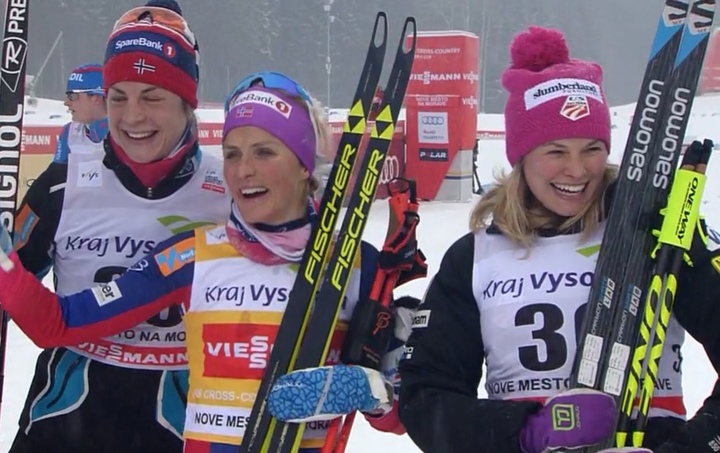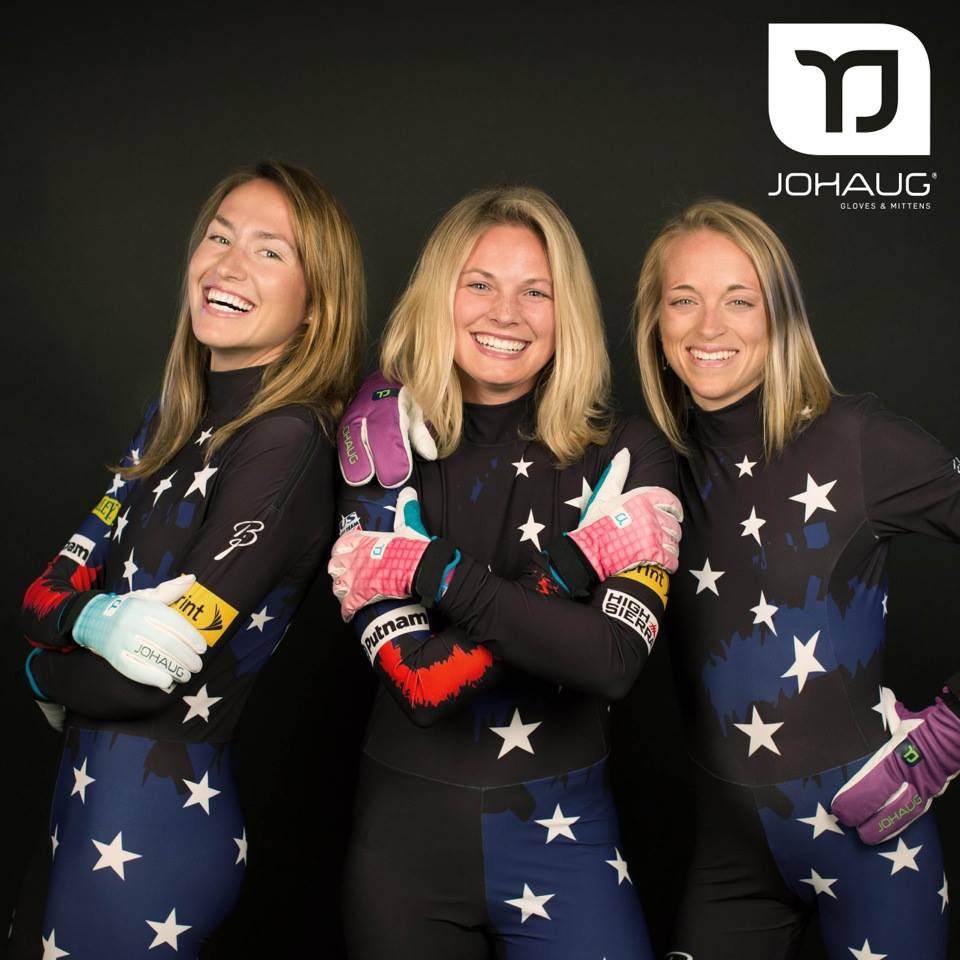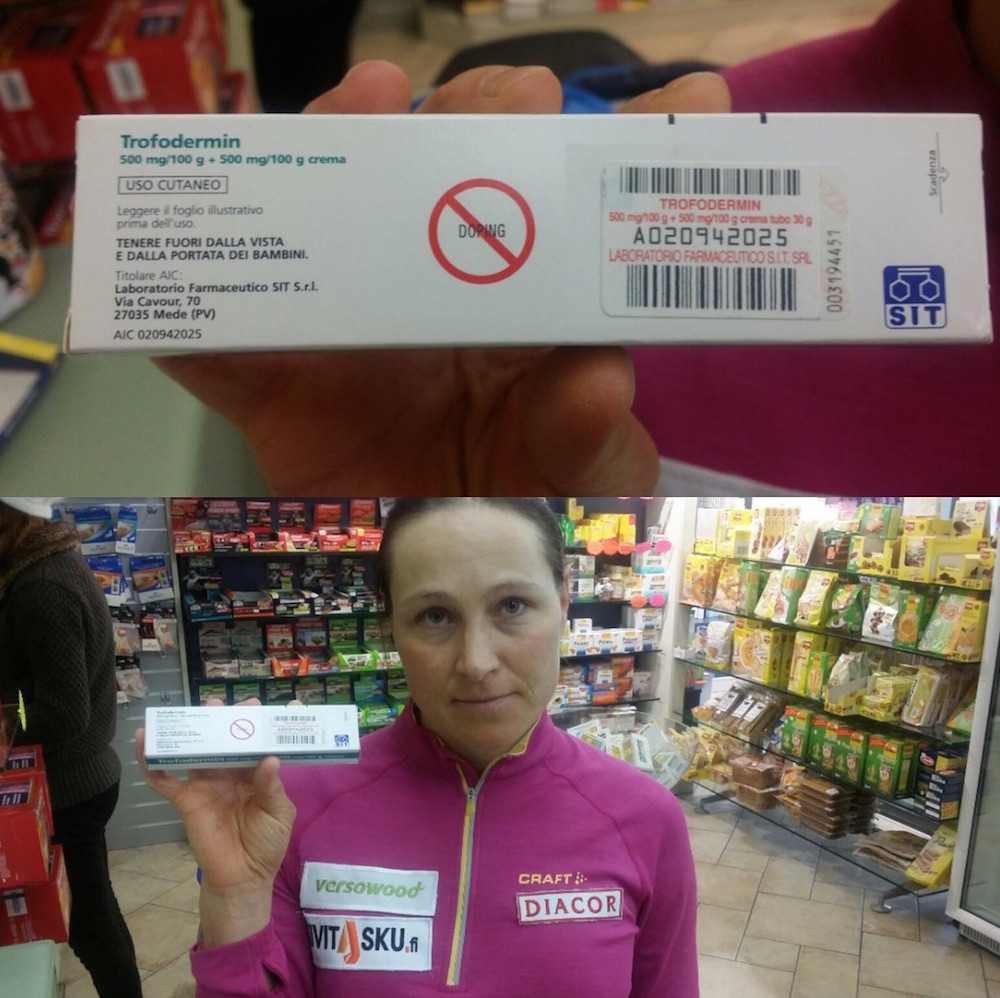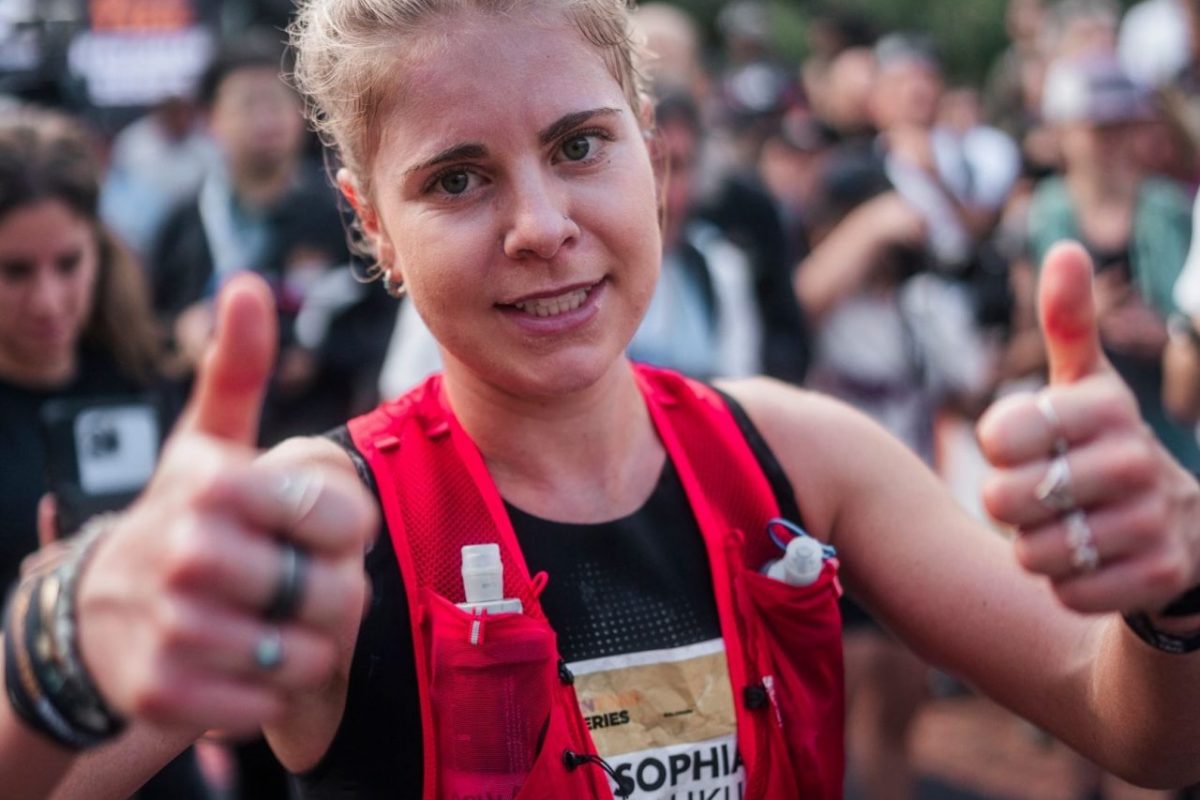
The morning news broke about Norwegian cross-country skier Therese Johaug’s positive drug test last week, emails circulated among the U.S. women’s ski team. Most of its athletes were stunned.
“Johaug’s positive test hit our women’s team pretty hard. We got a group email going first thing that morning so everyone had a good balance of information to wake up to,” U.S. women’s coach Matt Whitcomb explained in an email to FasterSkier on Sunday. “There has been a combination of disbelief that a mistake like this could happen again from Norway, but for the most part, our athletes are sympathetic to Therese. They know how easy it would be to take the wrong cold medication when your head is pounding and you haven’t slept in three days, or to take the wrong cream when you just want your lips to stop bleeding. Therese will continue to be a role model and friend to our team. She is not a cheater.”
That was the overarching message of Whitcomb’s 1,000-word email in response to the news about Johaug, a two-time overall World Cup champion and Olympic and World Championships gold medalist. She used the banned steroid clostebol in the form of a lip cream to treat her badly sunburned lips and was visited by doping control officers on Sept. 16. She told the officers she was using the lip cream Trofodermin, which she obtained from an Italian pharmacy while training in Livigno, but apparently did not realize it contained a banned substance. Her doctor bought the medication and reportedly assured her that it didn’t contain anything on the World Anti-Doping Agency (WADA) Prohibited List.
But it did — clostebol — and Johaug was informed of her positive test on Oct. 3. Today, Anti-Doping Norway, the first to handle the case, issued Johaug a two-month provisional suspension from competition and organized training until Dec. 18. Her case is now in the Norwegian Olympic Committee’s hands.
Is that fair? This past weekend, we asked three U.S. women’s team members previously sponsored by Johaug’s clothing line (they wore her gloves for two seasons, but switched to other companies this spring for reasons unrelated to this case), what they thought.
Jessie Diggins, who now wears Swix gloves for reasons outlined below, requested that her email response be used in its entirety. On Sunday, she wrote:
“I believe that this was an honest mistake, and I feel really badly for her [Johaug]. Everyone in the world has had the experience of trusting someone when they perhaps shouldn’t have, and and it makes you realize how lucky most people are that any simple mistake they make won’t cause them to be eviscerated in international press. And they’re lucky as hell not to have their medical history up for debate by people like the ones who comment on FasterSkier.
Even answering questions for this article will open me up for criticism, because people feel they have a right to pass judgement immediately on situations that they’ve never been a part of, and will never know all the details about. It’s one of the hardest things about being an athlete – giving up the right to defend yourself against people who will hate you because you’re good at your job, and then hate you for not being good at your job all the time.
But if I can say something directly to the people so quick to attack Johaug? Leave her alone. Let it go. It was an honest mistake, and guess what? She doesn’t win races by MINUTES because of any lip cream, she wins because she’s an amazing skier and very good at racing, and she works incredibly hard. I’ve seen how hard she trains and how much she cares about her teammates and I have a lot of respect for her.
I got to know Therese a little bit over the past year and she’s a pretty amazing person. I used to race on her gloves before switching to Swix gloves – not because of anything personal, simply because her ‘Johaug’ brand was focusing more on the clothing and Swix offered me a chance to make a fun design for myself on their gloves. And when I switched to Swix poles, I wanted to go in 100% and do the gloves, too. I loved that Therese donates a percentage of every glove sold to Active Against Cancer (I’m sure I’m not spelling it correctly when translated to English) and all the great things she’s done for sport shouldn’t be overshadowed by recent events.
I don’t think Therese should be banned from racing, because I believe that it was an honest mistake. When I toe the line in a World Cup, I want to race against the best in the world, and it won’t be the best unless she’s there racing. I don’t believe that the amount of clostebol she may have accidentally ingested through her lips would give her an advantage, and as a fellow athlete racing the World Cup I feel like I have just as good a chance at racing her as I did last year. If an athlete knowingly dopes and gains a serious advantage from it, well, that’s another story, but in this case I firmly believe she should be allowed to compete.
This is any athlete’s worst nightmare. According to an article by FasterSkier, the drug Therese tested positive for is amazingly sensitive ‘and there are documented cases of test subjects who had never taken the drug having it show in urine samples after eating meat from animals raised on the substance.’ So, as an athlete, it really makes me paranoid to do something as simple as eat a steak. I went back and re-checked all medications I’ve ever taken, even something as simple as vitamin C. Staff members have advised me on what to take when I’m sick on the road and in a foreign country, for example, but I always look it up on globaldro.com, a site where you can check (for US athletes, at least), the status of medications. But when you’re sick and tired and it’s someone you trust handing you an aspirin pill? Yeah, you want to just take it right away. The instinct to be suspicious and not trust people just isn’t there. And it’s definitely not something most people ever have to think about. It feels wrong to train the instinct to go and fact-check your doctors whom you know care about you and support you 100%, but that’s what you have to do.”
Sophie Caldwell and Liz Stephen both switched to Toko gloves this spring, with Caldwell explaining that it had “nothing to do with the recent news, just because Johaug is moving into more products than just gloves and looking to support athletes who can also wear the clothing and Toko seemed like a better fit for me…”

Caldwell added, “I personally feel very badly for Therese. I choose to give people the benefit of the doubt until given a reason not to. I am a strong advocate of clean sport, but I am also in no place to be accusing anyone of anything. I believe that it was an honest mistake and can’t imagine the pain she is going through right now. It is a wake up call to everyone to be double and triple checking any supplement or prescription we take.”
Whitcomb emphasized that the U.S. Ski Team (USST) tries to use medications and supplements as minimally as possible.
“But we all still have our medical needs from time to time,” he wrote. “When possible, we use familiar medications that we bring from the U.S. We never take any prescription medications without consulting our team doctors, who are all well-educated by USSA [U.S. Ski & Snowboard Association] in the WADA code. We’re not impervious to mistakes, but our athletes, doctors, and coaches are very respectful of and educated in the WADA code. We take a lot of pride in competing cleanly.”
During a given race season, the USST is accompanied by a medical pool of six to eight volunteer doctors for half the winter.
“When we don’t have a doctor with us, we always have our medical director on call in Park City, as well as any of our other team doctors,” Whitcomb explained. “Occasionally, one of our doctors will be asked to help a skier from another team that isn’t traveling with one that week, and vice versa.”
In a phone interview on Friday, Stephen explained that while she and her teammates expect their doctors to be up to speed on what’s legal and what isn’t according to WADA and U.S. Anti-Doping Agency (USADA) standards, the onus is ultimately on the athletes themselves.
“There’s never something that we just take without looking at it ourselves,” Stephen said. “If a doctor gives you something and he thinks it’s right, he could legitimately think it’s right as what I think has happened with this case, which is so sad for Therese, and for the doctor — I’m sure he feels absolutely terrible. But I think ultimately, the doctor isn’t who’s going to be remembered here, you know? This is a huge, huge thing for Therese and her career … because like it or not, whether it was an honest mistake or not, if you have your name and doping next to it, it’s a done deal…
“That’s why it’s so so important that with supplements and with whatever you are taking and rubbing on your skin or whatever, you are looking it up for yourself every single time because it is this kind of thing that is our worst nightmare as athletes,” she added.
Stephen sympathized with Norway for having its clean record in cross-country skiing tattered by two doping violations in the last three months, with Martin Johnsrud Sundby serving a two-month suspension for violating asthma-medication rules this summer.
“I see them very differently than I see the Russian violations, which were so obviously a violation of the anti-doping rules. EPO is such blatant cheating, it’s black and white,” Stephen said. “Perhaps I am just naive, but I see what happened with Sundby and certainly with Therese as very different. Therese is taking full responsibility for not checking Global DRO herself and just trusting her doctor. When you are in pain, or sick and all you want to do is feel better, sometimes you skip a step, and this is a terrible misfortune for Therese. I hope that it does not end up overshadowing some of the more severe doping violations that have gone on in the past year.”
Whitcomb also separated the cases of Johaug and Sundby, explaining that he believes the story told by Johaug and her doctor.
“I trust that it was a stupid mistake and I’m sad for them,” he wrote. “I am not a conspiracy theorist, and I’m not one of those guys that suspects doping every time someone does a little better in a race than normal. We witness those ethical bumps in performances on our team. With a few exceptions, I think women’s skiing is very clean these days. If I’m proven wrong, then I’ll be burned by it down the road. For now, my ability to trust lets me sleep at night, and it lets me focus during the day. The same is true for our athletes. We don’t get caught up in the unknown.”
On Sundby, Whitcomb wrote:
“I have less sympathy for the abuse of asthma medication. For starters, it’s not fair to asthmatics who are prescribed medicine and use it ethically. They now feel self-conscious when they take their medication, and their health requires it. What also bothers me about the Sundby case is the amount of medicine that was being ingested. But he got busted and has paid for it, mostly in the currency of credibility. His actual suspension was pretty short. I trust that he and Norway will not do this again, and I’ll still cheer for him on the course this winter.
“What bothers me most about this all is that it’s a major distraction from a larger issue,” he added, echoing Stephen’s remarks on Russia. “The timing of Norway’s troubles could not be worse for skiing. The skiing world, through the pending results of Richard McClaren’s report, is trying to solve the allegations that Russia cheated in the Olympics they hosted.”
At the end of the day, Whitcomb explained that the penalty for doping infractions “at the extreme end of the doping continuum” should be much more firm. He is an advocate for lifetime bans, when appropriate.
“Because the current penalties for cheating are so soft, the most serious deterrent at this point, in my opinion, is shame,” he wrote. “Unfortunately, I don’t think all cheaters have that emotion. Even a four-year ban doesn’t seem like it adequately penalizes someone that uses EPO. It’s not like they go into a prison cell for four years, like when someone steals a couple cars. They just can’t ski race for a little while. That’s too light.”
Whitcomb recommended splitting the banned list in two for less severe and more severe infractions.
“I have no problem with what happened to Evi Sachenbacher-Stehle in Sochi, or to Sundby this year, and what is likely to happen to Johaug. You make a small mistake, you get a small penalty,” he wrote. “But when it comes to EPO, anabolic steroids, human growth hormone, or other drugs that are so clearly used to cheat, I never want to see them in a race again. Since doping is in the news now, I think it’s time to talk about how a lifetime ban would help solve our problems. The stakes are currently too low.”
Saarinen Goes Straight to the Source
Last Thursday, Aino-Kaisa Saarinen, a 37-year-old Finnish world champion who sat out last season while pregnant with her first child, tweeted a photo of herself at a Livigno pharmacy. She took a close up of the Trofodermin packaging, which displayed a red circle with a slash through it over the word “DOPING”.
“Kävin uteliaisuuttani Livingon apteekissa katsomassa miltä pakkaus näyttää. Voiko tästä paketista lääkäri erehtyä sopingin suhteen?” Rough translation: “Out of curiosity, I went to a Livigno pharmacy to see how the packaging looks. Can this package be mistaken by a respectful doctor?” pic.twitter.com/hK7JXYtjs5
— Aino-Kaisa Saarinen (@Aino_Kaisa) October 13, 2016
“For me it seemed very clear,” Saarinen wrote in an email to FasterSkier on Monday. “At least symbol like that should ring the bell, because you never see such symbol in anything you take. I understand that one can make a mistake about that symbol, but if you are a doctor, I think it should be impossible to misunderstand that.”
She was “almost shocked” when she heard the news about Johaug and had a hard time believing it, adding that she had never been suspicious of Johaug.
“Therese is lovable and awesome personality and I always had great respect towards her,” Saarinen wrote. “Great athlete and great person. I actually had little bit similar feelings as I had as young athlete in 2001 when a lot of Finns were catched [sic] for doping. Could not believe that either, at first.”
What does Saarinen hope becomes of the investigation on Johaug? “Careful inspections, which follow the common rules and the punishment should be in the scale what is written on WADA rules,” she wrote. “All nations and athletes must be committed to follow those same rules. That’s fair play. Otherwise the whole system is not credible at all.”
Saarinen has previously been outspoken on social media and in the news for her anti-doping sentiments.
“After Finnish skier Tero Similä got banned, I started an antidoping campaign, where the slogan was: ‘Today’s top athletes are responsible of future stars and future of clean sport’,” she wrote. “The idea was that athletes would go to talk about antidoping work together with National Antidoping agency to spread to word and idea that antidoping work is good for us and for our sport. I still do these sessions, they are really popular and other athletes have done it also. After Sundby case I tried to throw that challenge internationally as well.
“I [voice] my opinions on social media, because I think that talking about these things is also antidoping work,” she added. “These cannot be taboos. I would like to see other active athletes to [voice] their opinions as well, but I understand very well why it is not easy. It has been a taboo for a long time in history and for sure not all people will like those opinions, whatever they are. You will get some love and some hate, but that’s freedom of speech as well.”
A World Cup competitor since 1998, Saarinen believes cross-country skiing at the highest level is getting cleaner.
“I tend to trust that system works all the time better and better and people [who] do doping will get caught,” she wrote. “… There is always different opinions. One extreme example is one Finnish reporter which claims that it is not possible to be on the podium in world championships or in Olympics in individual sport without doping. I personally know that it is not true. That’s also one reason to talk about these things, so that the youth understands to not believe anything the reporters claim.”
Alex Kochon
Alex Kochon (alexkochon@gmail.com) is a former FasterSkier editor and roving reporter who never really lost touch with the nordic scene. A freelance writer, editor, and outdoor-loving mom of two, she lives in northeastern New York and enjoys adventuring in the Adirondacks. She shares her passion for sports and recreation as the co-founder of "Ride On! Mountain Bike Trail Guide" and a sales and content contributor at Curated.com. When she's not skiing or chasing her kids around, Alex assists authors as a production and marketing coordinator for iPub Global Connection.




